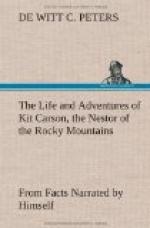Business or no business to transact with Kit Carson, they cannot come to town without visiting “Father Kit,” and having a smoke and talk with him. Kit Carson enjoys himself in their society, for his heart and hand have long since taught them that, irrespective of the office which he holds towards them, he is their true friend and benefactor. Never is his patience exhausted by their lengthy visits. He listens to their narrations of grievances which they lay freely before him for his counsel, even in matters exclusively personal. Being familiar with all those things which will, in the least, touch their feelings and make them interested, he finds no difficulty in entering into the spirit of their affairs in a manner that exactly suits their tastes. This causes them to look upon him in the same light as they would upon some brave and experienced chief of their own race.
Kit Carson takes every opportunity to warn the Indians against the use of intoxicating drinks, and shows them by his own example, that “fire water” is a dangerous luxury which man does not require and in which he should not indulge. Notwithstanding his best efforts, now and then they get under its influence. On becoming sober, they are so ashamed of their conduct that they often keep clear of their agent until they think he has forgotten the occurrence. Kit Carson, to a certain extent, treats Indians as a wise father does his own children; hence, he has won their respect as well as confidence, which fact has given him more influence over them, than any other man in the country where he lives. When Kit Carson enters the various villages of the Indians under his supervision, he is invariably received with the most marked attention. Having selected the warrior whose guest he intends to be, he accompanies him to his lodge, which is known during his stay as the “soldiers’ lodge.” He gives himself no concern about his horse, saddle, bridle rifle or any minor thing. The brave whom he has thus honoured, considers that he has assumed the responsibility of a “soldier,” and so styles himself. This making of a “soldier” is no every day business with the Indians. It is only when they are visited by some great personage for whom they have the greatest respect, that this ceremony is gone through with. When thus favored, the “soldier,” at once, becomes the sworn friend of the white man who occupies his lodge, and will fight and die for him even against his own brethren.
It is the opinion of Kit Carson, that Indians should not be allowed to come, when it pleases them, into the settlements. Every visit which they thus make is detrimental to them in many ways. He thinks that the time thus spent could be better employed in hunting or otherwise providing for the wants of their families. In the towns of the frontiers they do nothing but beg and learn the vices of the white man, which, added to their own, make them as dangerous and wicked as men can be. In lieu thereof,




